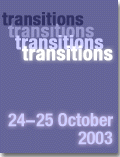
Papers from the ColloquiumIntroduction: Toni GriffithsA broad question which will undoubtedly be raised in all kinds of ways during the Colloquium concerns the changes in universities as they respond to demands that they serve in various ways the putative needs of globalised knowledge societies. But a question for our new Centre and this Colloquium is - as universities become increasingly marketised and directed towards practical, entrepreneurial objectives, do they run the risk of losing sight of their purposes and traditions, including that of the pursuit of truth for its own sake? As they go through these transitions, contradictions and tensions inevitably arise - between, for example, the need to be competitive, the need to be of the highest quality and the need to widen participation. The sounds of clashing ideologies – ‘pernicious’ and ‘virtuous’ (Barnett 2003) – are heard in the academy. The President of the Latin American Council of University Presidents, Professor José Raymundo Martins Romêo, told this story in the context of university change at a UNESCO conference last year: ‘Two men are running away from a tiger. One says to the other: “It’s no good, we will not be able to run faster than the tiger.” The second replies, “I am not trying to run faster than the tiger, I am trying to run faster than you”’ (Romêo 2003). Transitions can be dangerous. Working in a genuinely interdisciplinary way is extremely challenging, possibly dangerous. The shape of the disciplines is not inevitable; they have developed over time as organised bodies of knowledge, and modes of investigation for producing and testing new knowledge, that deserve respect; even though they may be fallible they are still the best means we have for learning about the world. A researcher who wishes to engage another discipline is thus involved in a complex task: enough should be known enough about the other discipline so that it is not used in ways that will seem inappropriate to its own practitioners. And, of course, contestation necessarily abounds within the disciplines as well as between them. Overall, care needs to be taken lest the new interdisciplinarity be simply a kind of cafeteria of the theories where there is freedom to choose whatever may turn out to be useful for particular projects. The criterion in such cases may be little more than usefulness to the researcher, something which has been described as the criterion of ‘comfort’ (Esterling and Riebling 1993). By contrast, to engage sufficiently with the other discipline is a tough process, one which leads to new understanding. Further, being able to hold in mind what is important from the other discipline during the process of research requires what I think of as a strenuous internal dialogue – which makes a demand not only upon the researcher but also upon the research audience. It is obvious that this has implications for the form as well as the substance of the research or the critical engagement. Mutual learning in this sense is an active and rigorous and certainly not a passive process. In the broad field of higher education research, there is every reason to draw on a wide range of disciplines - philosophy, psychology, history, the sciences – in order to think better about the processes of political or social change and to subject those processes to a different and more rigorous examination. If the butterfly effect of Chaos Theory calls into question the idea that minor individual actions are necessarily overwhelmed by giant systems (whether physical or social), then there is much to be said for epistemic modesty and for recognising that what gets left out of a grand system – the ‘surplus’ – may be the matrix from which new understandings can emerge. In establishing our new Centre at UCL, there is a unique opportunity for knowledge and insight which lie beyond the Higher Education field itself to make a significant and new kind of difference to how that field is developed – whether in policy or epistemology. In this process, we would do well to note the recent warning by that excellent sociologist of education, Jo Muller (2003), of ‘the potential vulnerability of the HE field to discursive fads and fashions from intellectual parent disciplines which are recontextualised in the HE field not so much as contending accounts but as fixed rival positions with a special afterlife long after the positions have achieved a more sophisticated rapprochement in the parent disciplines’. During the lifelong learning theme tomorrow – and probably today - the question of what constitutes knowledge and skill will undoubtedly arise. There is a disturbing trend in policy making to conceive of knowledge and skill as commodities to be built into curricula, acquired, converted into people’s private property and used mechanistically to inform conduct. The movement – or transition - from HE to work, for example, is not simply a matter of building employability skills, as policy makers would put it: the point is rather to assist those in transition to respond to the diversity of forms of knowledge, whether in formal or informal learning contexts. These transitions involve changes in identity as well as changes in knowledge and skill: they involve the full person and are not just learned attributes or techniques which are context-free. These connections of course suggest challenges for what is meant by lifelong learning and the role of different sites of learning, including HE, in that process. Tensions and contradictions must inevitably arise as learners cross boundaries – and the transition from school to university understanding of mathematics is just one case in point. The macrosystemic approach to innovation in education and training avoids, however, this engagement in that it offers the comforting but misguided solution that the redesign of management arrangements will guarantee reform of learning, ignoring the more difficult question of how individuals actually learn. What therefore can policy research learn from the ‘counsel literature’ of the Renaissance in which confronting rulers, often dangerously, with painful truths – rather than reassurance - was understood as the way forward? Some critics (eg, Dawson 2003) have searched recently for a perspective on lifelong learning that is not reducible to the imperatives of the market or the certainties of managerialism and have sought a framework of understanding which stands in tension with the dominant policy discourse, rejecting the idea of the learner as a consumer or customer and expressing the idea of the learner as a whole person engaged in the lifelong process of trying to live in the world fully and engage with its paradoxes and contradictions. T. S. Eliot’s searching questioning in the Four Quartets of the ambiguous relationship between meaning and purpose is drawn upon to express this difference: ‘And what you thought you came for is only a shell, a husk of meaning from which the purpose breaks only when it is fulfilled, if at all. Either you had no purpose, or the purpose is beyond the end you figured, or altered in fulfilment’. These lines much more nearly express what can go on in the learning process than the ‘fix and tick’ outcomes approach to which universities as well as schools are exhorted. The pedagogy of compliance is more irritating but easier than that of critique. The hard work of searching for meaning often does not proceed to the anticipated ends in the anticipated manner and this is a necessary expression of the university. Indeed, such transitional states are the true field of engagement for lifelong learning, a process of grappling with major questions about disciplinary and personal identity, ‘costing not less than everything’. George Eliot says in Adam Bede that, ‘no story is the same to us after a lapse of time; or rather, we who read it are no longer the same interpreters.’ Her books have been approached from a variety of perspectives during the last 40 years: archetypal, psychoanalytical, Marxist, structuralist, feminist, deconstructive, cultural and biographical. Each age reinterprets such works for itself and the process of interpretation never ends. Epistemic modesty may thus be an appropriate stance as we think about transitions of different kinds in the context of interdisciplinarity. ReferencesBarnett, R. (2003) Beyond all Reason: living with ideology in the university, SRHE/Open University Press Dawson, J. (2003) ‘Lifelong Learning and T.S. Eliot’s Four Quartets’ in Studies in Continuing Education, 25,1, 113-124 Esterling, N. and Riebling, B., eds. (1993) After Poststructuralism: Interdisciplinarity and Literary Theory, Illinois: Northwestern University Press Muller, J. (2003) Review of Barnett, R. (2003) Beyond all Reason: living with ideology in the university, SRHE/Open University Press, in Teaching in Higher Education, 8,4, 590-594 Romêo, J.R.M. (2003) ‘Higher Education in Latin America’
in Higher Education in Europe, 28,1, 41-49 |

